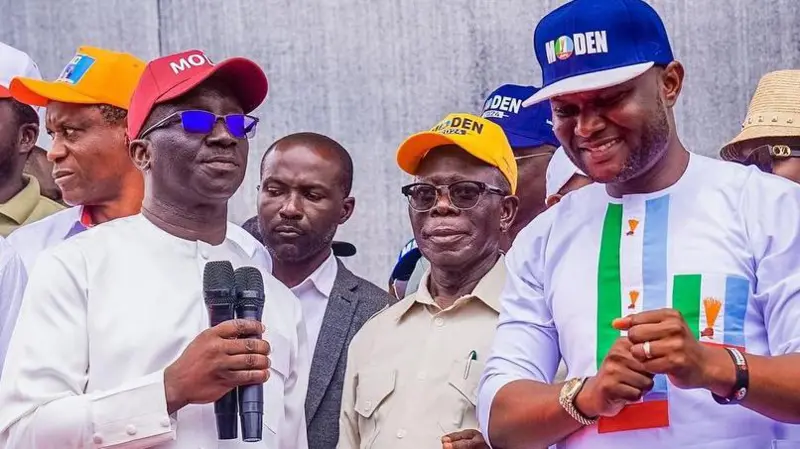The 2024 Edo State governorship election marked a significant moment in the state’s political journey. It saw the rise of Monday Okpebholo of the All Progressives Congress (APC), defeating his closest challenger, Asue Ighodalo of the Peoples Democratic Party (PDP). The results, while decisive, highlighted deep political divisions within Edo State and raised important questions about the effectiveness of party strategies, voter turnout, and the overall conduct of the election.
One of the most notable aspects of the election was the competition between the two leading parties, APC and PDP. With Okpebholo receiving 291,667 votes and Ighodalo trailing closely with 247,655 votes, the race was tighter than some observers had anticipated. The close margin underscores the competitive nature of Edo’s political environment, where no single party can afford to be complacent. The APC’s victory in 11 local government areas (LGAs), compared to PDP’s 7, reflects a fairly balanced political structure, challenging any assumptions of an outright dominance by either party.
A critical factor in this election was the role of the Labour Party (LP). Olumide Akpata’s 22,763 votes may seem small compared to APC and PDP, but his presence signals an emerging political force. The Labour Party’s limited success reflects a shift among younger and progressive voters seeking alternatives to the traditional two-party system. Akpata’s modest showing suggests the Labour Party isn’t a major player yet, but it could grow if it builds on its support base.
Voter turnout also played a key role in shaping the final results. Although precise figures are yet to be fully confirmed, the general sentiment points to a less-than-enthusiastic turnout. This trend of voter apathy has become a common issue in Nigerian elections, where many citizens feel disillusioned with the political system. For instance, the electorate’s skepticism around promises of improved governance may have contributed to the relatively low engagement. Both leading parties will need to address this in future elections by re-establishing trust with the populace and ensuring that their campaign messages resonate with voters at the grassroots level.
However, the election also exposed some ongoing concerns regarding the electoral process in Nigeria. Several reports from election observers highlighted logistical challenges, delays, and instances of violence at certain polling stations. While the Independent National Electoral Commission (INEC) was able to announce the results relatively quickly, these issues cast a shadow over the overall integrity of the process. Incidents of unrest, like protests outside INEC’s Benin City headquarters, show some stakeholders were dissatisfied with the election. These protests, combined with the PDP’s promise to challenge results in court, indicate the post-election period may involve legal battles and political maneuvering.

The APC’s success stemmed from grassroots mobilization and strong messaging in key areas. Okpebholo’s performance in Akoko-Edo and Etsako West showed APC’s ability to consolidate support where its policies resonated. Meanwhile, the PDP remained strong in Ovia North East and Orhionmwon but may need to rethink strategies in weaker regions. Both parties rely on regional strongholds, highlighting the challenge of building a statewide coalition that appeals to all voters.
Moreover, the economic situation in Edo State undoubtedly influenced voter behavior. With rising unemployment, poverty, and infrastructural deficits, many citizens approached the election with a degree of cynicism. Economic hardship has often led to voter disillusionment, where promises of reform are met with skepticism. For the incoming administration, addressing these economic challenges must be a top priority. Failure to do so could erode public confidence further and set the stage for more volatile elections in the future.
It is also essential to consider the implications of this election for Nigeria’s broader political landscape. The APC’s victory in Edo could have ripple effects on the national stage, particularly as the country heads towards future elections. Edo State, historically a battleground state, is often seen as a bellwether for national political trends. This election’s outcome will likely influence APC and PDP strategies, prompting reevaluation based on lessons learned in Edo.
Therefore, the 2024 Edo State governorship election was a complex and closely fought contest. Monday Okpebholo’s victory marks a significant win for the APC, but deeper challenges remain for both parties. Alternative political movements, voter apathy, logistical problems, and economic grievances will shape Edo State’s political future. The new administration must confront these issues directly to fulfill promises and maintain voter confidence as it takes office.
____________________________
Thank you for your time here. This means a lot to us. If you are passionate about driving change through workshops, e-mail info@insidesuccess.com. Find other related articles on our website and follow us on Instagram @InsideSuccessNigeria for more updates.



Leave a Reply